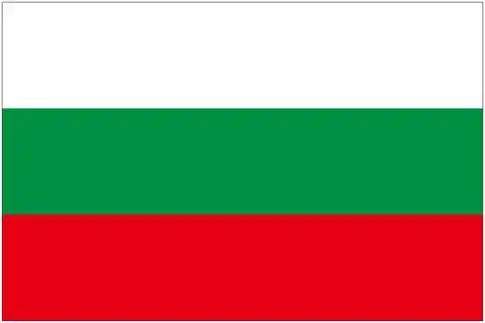Overview of Investment in Bulgaria

Overview of Investment in Bulgaria
Overview of Bulgaria
1. Basic information
Country name: The Republic of Bulgaria.
Area: 111000 square kilometers.
Population: 6.44 million (2022), the main ethnic group is Bulgarian (84%), others include Türkiye (9%), Roma (5%), etc.
Capital: Sofia, with a population of 1.274 million people (2022).
Official language: Bulgarian, Turkish is the main minority language.
Religion: 85% of residents believe in Eastern Orthodoxy, and 13% believe in Islam.
2. Geographic location and climate
Location: It is located in the east of the Balkan Peninsula in southeast Europe, bordering Romania, Serbia, Northern Macedonia, Greece and Türkiye, and bordering the Black Sea in the east.
Climate: The northern region has a continental climate, while the southern region has a Mediterranean climate. The average temperature is around 0 ℃ in January and 24 ℃ in July.
3. Historical evolution
In ancient times, the Thracians were the oldest inhabitants of Bulgaria. In 681, the Thracians, Slavs, and ancient Bulgarians established the Slavic Bulgarian Kingdom (First Bulgarian Kingdom).
In the Middle Ages, it was occupied by Byzantium in 1018, the Second Kingdom of Bulgaria was established in 1185, and was annexed by the Ottoman Empire in 1396.
In modern times, it gained independence from Ottoman rule in 1878, established the People's Republic of Bulgaria in 1946, and changed its name to the Republic of Bulgaria in 1990.
International relations: Joined NATO in 2004, joined the European Union in 2007, and joined the Schengen Area on January 1, 2025.
4. Politics and Economy
Political system: Multi party parliamentary democracy, with the President as the Head of State and the current President being Rumen Radf (elected in 2016 and re elected in 2021).
Economic data: In 2022, the gross domestic product was 84.56 billion euros, with a per capita GDP of 12400 euros and a growth rate of 3.4%.
Main industries: The service industry has the highest proportion (67.6%), followed by industry (28%) and agriculture (4.6%).
5. Culture and Festivals
Important holidays: National Day (March 3rd, commemorating the liberation from Ottoman rule in 1878), Education, Culture, and Slavic Language Festival (May 24th).
Cultural characteristics: Bulgaria is one of the birthplaces of Slavic culture, where Eastern Orthodox and Islamic cultures coexist.
6. Natural resources and infrastructure
Natural resources: The main minerals include coal, lead, zinc, copper, etc., with a forest coverage rate of about 37%.
Infrastructure: The total length of national highways is 19602 kilometers, the total length of railways is 4019 kilometers, and there are 5 international airports.
Bulgaria is a country with a long history and diverse cultures. In recent years, it has steadily developed economically and politically, becoming an important member of the European Union and NATO.
The economic profile of Bulgaria can be summarized as follows:
1. Economic aggregate and per capita income
Bulgaria's total GDP is 84.56 billion euros, with a per capita GDP of 12400 euros. In 2024, the average net income of Bulgarian workers is 701 euros per month, which is the lowest in the European Union.
2. Industrial structure
Bulgaria's economy is mainly composed of agriculture, industry, and service industries. Agriculture plays an important role in the economy, mainly planting crops such as wheat, corn, and sunflowers, and animal husbandry is also quite developed. In terms of industry, chemical and food processing are traditional advantageous industries, while the energy industry is dominated by coal and nuclear energy. In the service industry, tourism is an important economic growth point, especially the resorts and historical sites on the Black Sea coast that attract a large number of tourists.
3. History of Economic Development
Bulgaria suffered a huge economic blow after its economic ties with the Soviet Union were severed in 1989. The economy began to recover in 1994, but due to insufficient economic reforms and an unstable banking system, it collapsed again in 1996. Since 1997, the economy has gradually recovered, especially after joining the European Union and Schengen Area, with significant improvements in international trade and tourism.
4. The impact of joining the European Union and Schengen Area
Bulgaria joined the European Union in 2007 and the Schengen Area on January 1, 2025. These changes have greatly stimulated its economic vitality, especially the cancellation of land border controls with other Schengen countries, promoting the development of international trade and tourism. The accession to the Schengen Area is expected to bring direct benefits of approximately 1.6 billion Bulgarian lev (approximately 845 million US dollars) to Bulgaria annually.
5. Challenges Faced
Although Bulgaria has made some progress in terms of economy and society, it still faces some challenges. The lagging infrastructure construction, especially the weak connection between railway transportation and neighboring countries, has constrained further economic development. In addition, border security pressure has increased with the full accession of the Schengen Area, posing certain challenges to social stability and economic development.
The investment prospects of Bulgaria are very optimistic, especially in 2025 and beyond, as its investment environment, economic policies, and geographical location have attracted a large amount of investment.
Firstly, Bulgaria has a favorable investment environment, with the government encouraging foreign investment through a series of preferential policies. The relatively low corporate income tax rate in Bulgaria helps to increase the profit margin of enterprises. In addition, Bulgaria has skilled and highly educated labor resources, particularly in the fields of IT, engineering, and science, with relatively low labor costs, which helps businesses reduce operating costs.
Secondly, Bulgaria has a superior geographical location at the intersection of Europe and Asia, making it an ideal springboard for businesses to enter both markets. Starting from January 1, 2025, Bulgaria will become a full member of the Schengen Area, lifting land border controls with other Schengen countries. This will bring significant benefits to the logistics and tourism industries, and is expected to drive economic growth and attract more foreign investment.
In addition, Bulgaria has made significant progress in the field of technology, especially in the IT industry, and has become the technology center of Eastern Europe, attracting the attention of a large number of technology companies. The government has also launched multiple programs to support innovation and startups, injecting strong momentum into the development of enterprises.
However, Bulgaria also faces some challenges, such as lagging infrastructure construction and increasing pressure on border security, which may become a long-term focus of social development. Nevertheless, the Bulgarian government is working hard to address these issues in order to fully utilize its potential as a Schengen member state.



